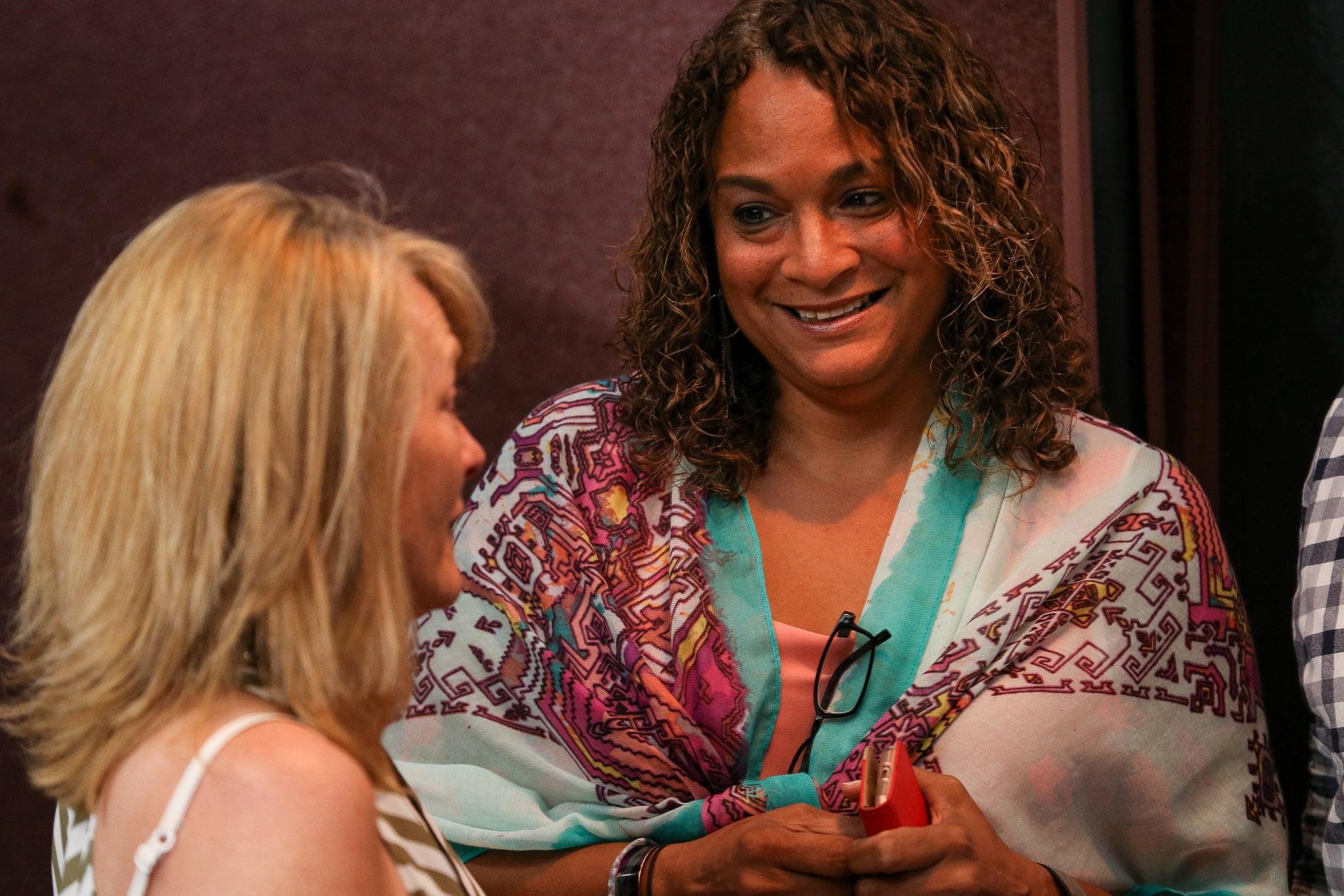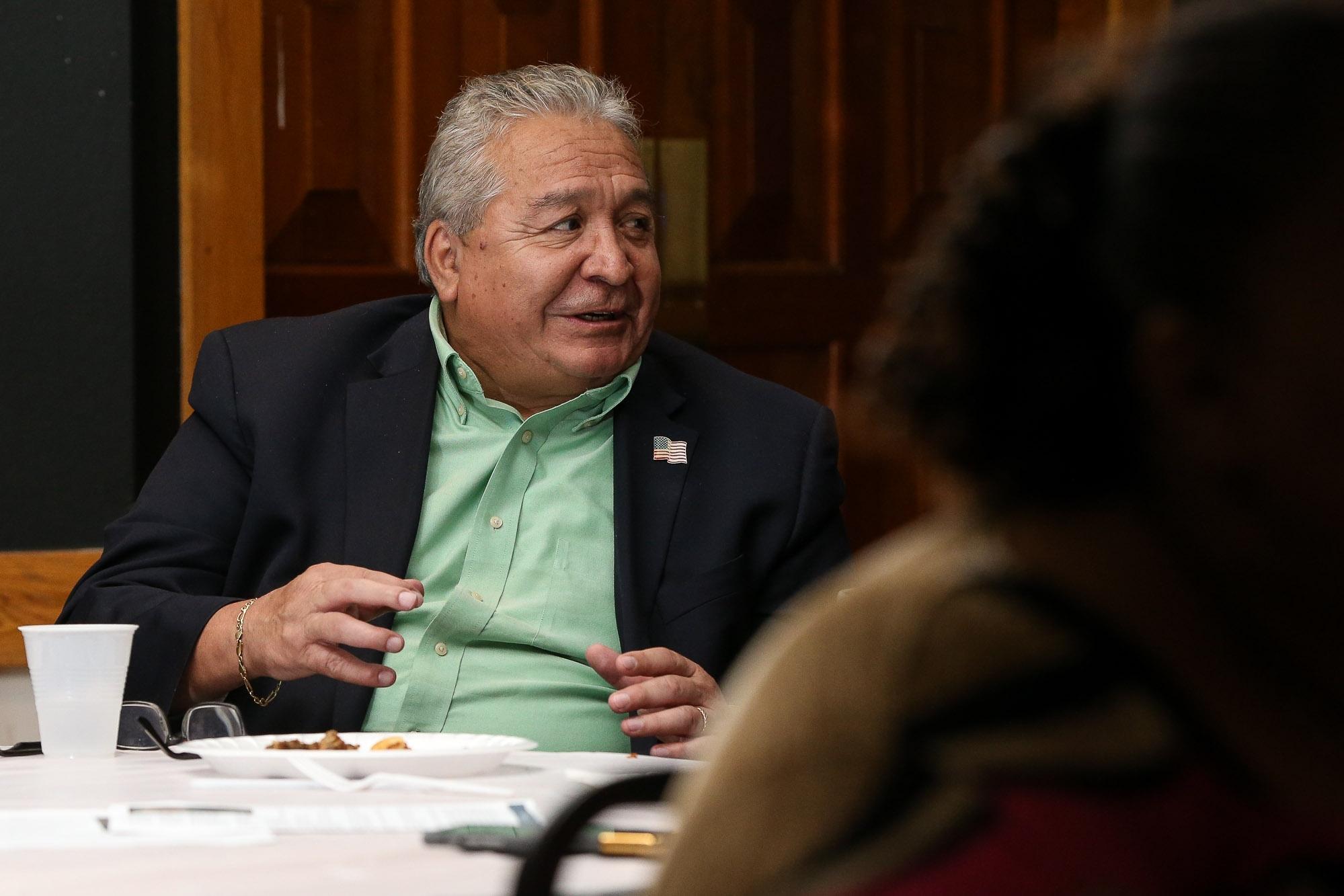Brazilians, Latinos see opportunity in Framingham city election
Published June 17, 2017 in The MetroWest Daily News

FRAMINGHAM — Inside the broadcast booth at WSRO, a discussion is unfolding about Framingham’s future.
General Manager Ilma Paixão and radio host Silvio Brauna are interviewing a 29-year-old candidate about her bid to become Framingham’s first mayor.
Speaking in Portuguese, the trio discusses the different political climates in Brazil and the United States, and the need for immigrants to participate in Framingham’s first city election.
“Everything starts with changing our way of thinking,” says Priscila Sousa, the candidate for mayor. She points out the strength of the local Brazilian population, encouraging listeners to get involved in the community.
While they talk, Brauna scans through questions from the audience on his cell phone. He asks if Sousa is at a disadvantage running against more established politicians in Framingham, such as former five-term state Rep. John Stefanini, one of her potential opponents. Sousa notes the success of other young politicians, including Fall River Mayor Jasiel Correia, who took office last year at age 24.
“I see my age as an advantage and not as a problem,” she says.
If she prevails in the city election, Sousa will become not only one of the state’s youngest mayors, but also one of relatively few high-ranking elected leaders in Massachusetts with Latin American heritage.
More than 10 percent of the state’s population now identifies as Hispanic or Latino. While those groups have made inroads in politics in recent years, they have historically been underrepresented in both the Statehouse and in local town halls, including in Framingham.
As the town prepares to usher in a new city government next year, local community leaders believe the transition will provide an unprecedented opportunity for immigrants to secure a place in Framingham’s political firmament.
Where they once struggled to win appointments to municipal boards or Town Meeting seats, some local Brazilians and Latinos believe they’ll face a more level playing field in races for city government.
“We have not yet at this point been able to really get the involvement of all the communities that represent Framingham,” Paixão said.
Being counted
At least half a dozen Brazilian or Latino candidates have pulled nomination papers for the city election — evidence, Paixão said, that Framingham’s transition is giving members of immigrant communities the courage to run for office.
Paixão, a longtime community activist who moved to Framingham from Brazil three decades ago, took to the airwaves Thursday to announce a new program joining WSRO’s lineup. On Monday evenings, candidates for office will field questions from the station’s audience during a new segment called “Getting To Know Your Town.”
“Regardless of who wins,” Paixão said, “I think we’re going to have a community that’s more involved and more conscious.”
Brazilians and Latinos are among the fastest-growing demographic groups in Framingham, though tracking the exact size of the two communities is challenging because of variations in how their populations are recorded.
Many use the term Latino to refer to all people with cultural ties to Latin America. However, many Brazilians don’t identify themselves as Latinos. The U.S. Census Bureau also excludes Brazilians from its definition of Latino and Hispanic — a term that commonly refers to people from Spanish-speaking countries.
Based on census data, about 12,000 of the roughly 70,000 people who live in Framingham are Latino, according to a 2015 report by the Mauricio Gastón Institute for Latino Community Development and Public Policy at UMass Boston. That number likely doesn’t include all of Framingham’s Brazilians, since it counts only those Brazilians who identified themselves as Latino on the census. Many immigrants who are not U.S. citizens are also reticent to be counted.
Some 6,000 Brazilians are believed to live in Framingham, according to researches at UMass, making them the town’s largest immigrant group. While other communities in Massachusetts have significant Brazilian populations, Framingham’s Brazilians are tightly concentrated downtown, where the yellow and green colors of the Brazilian flag are displayed in many storefront windows.

Equal representation
Other large Latino groups in Framingham include roughly 3,200 Puerto Ricans, 1,200 Dominicans, 1,100 Guatemalans and 1,000 Salvadorans. Puerto Ricans were among the first to settle in Framingham, coming as early as the 1930s. Waves of Brazilian migrants followed in the 1980s and 90s, helping to sustain the community’s struggling downtown as retail activity moved to Rte. 9 and major manufacturers closed down.
While they have distinct backgrounds, Sousa said many Latinos and Brazilians share common concerns, including English language education in local schools and the business climate in Framingham.
“I think there are common concerns that unite the entire immigrant community in Framingham,” Sousa said, “not just the Brazilians. Due to the current national political climate, I think security and safety is a big concern. Is local law enforcement a friend or a foe? And … is using public services, being part of the community, something that is going to put us in jeopardy? And that’s a major concern right now.”
Selectman Cesar Monzon said one of his concerns is increasing diversity among town staff. Monzon, who served previously on the School Committee and chaired the Framingham Economic Development and Industrial Corporation, said Latinos have been successful winning office in Framingham, but have yet to crack the upper echelons of town administration.
“That’s where the decisions are made for the town,” said Monzon, who is mulling a run for City Council. “From the assessor’s office to the building inspector to the health department, you name it, and we don’t have that many folks there. Those that we have there are not in a position of power.”
City Council candidate Sylvia Ruiz said she was encouraged to run by friends and neighbors to ensure Latinos on the Southside have a voice in the new government. The daughter of Puerto Rican immigrants, Ruiz is mounting her first run for office in the newly-formed District 7.
“What they’re looking for is equal representation,” Ruiz said of local Latinos. “That person they can go to and know they’re going to be listened (to).”
Laura Medrano, who lives in District 7, said she was encouraged to see a Latina candidate from her neighborhood in the race. A Framingham resident for more than 30 years, Medrano said the town has struggled to bring diversity to its boards and committees. At times, only a handful of minority volunteers served in important positions, she said.
“This is a chance to get really in the mix,” she said.
